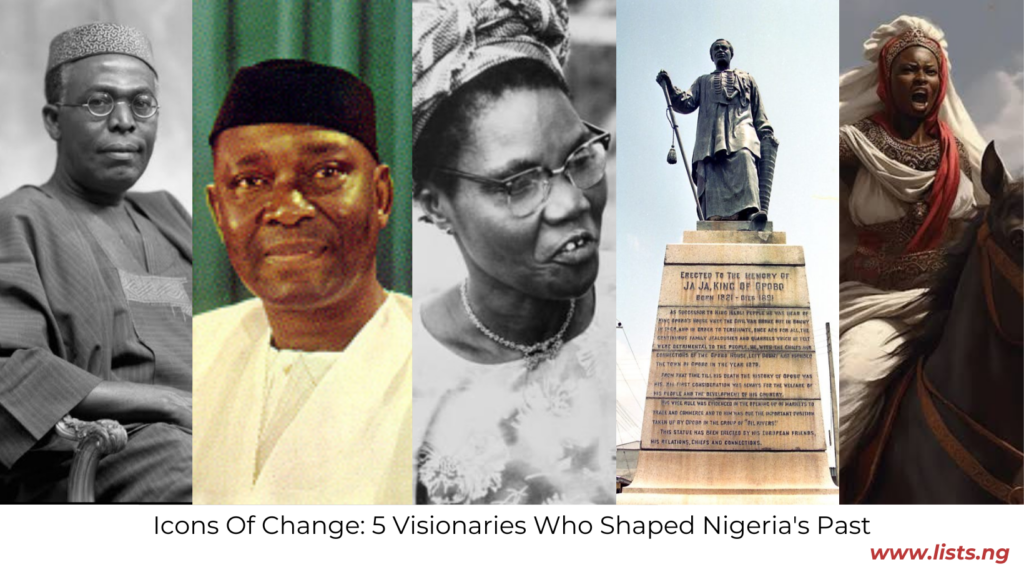Nigeria, with its rich and diverse history, has been shaped by numerous remarkable individuals whose legacies continue to influence the nation. These heroes and heroines have left indelible marks on the nation.
From the ancient kingdoms and empires to the colonial period and the struggle for independence, and beyond, these heroes and heroines have played pivotal roles in Nigeria’s development.
Here, we explore some of the most significant figures who have left an incredible mark on the country’s history.
- King Jaja Of Opobo (1821-1891).
Born as Mbanaso Okwaraozurumbaa, King Jaja of Opobo was a prominent Igbo merchant and the founder of the Opobo city-state. He rose from slavery to become a powerful king and a major player in the palm oil trade, which was vital to the Nigerian economy in the 19th century. King Jaja’s resistance to British colonial interference made him a symbol of defiance against external domination.
His efforts to maintain the independence of Opobo and control over trade routes were ultimately thwarted by British colonial forces, who exiled him to the West Indies. Nevertheless, his legacy endures as a reminder of the importance of sovereignty and economic independence.His resistance against British colonial rule and economic exploitation marked him as a significant figure in Nigeria’s history of resistance.
- Funmilayo Ransome-kuti (1900-1978)
A pioneering feminist and political leader, Funmilayo Ransome-Kuti was instrumental in advocating for women’s rights and social justice in Nigeria. She led protests against unfair taxation and colonial policies, founded the Abeokuta Women’s Union, and played a key role in the formation of the Nigerian Union of Teachers. Ransome-Kuti’s activism extended beyond women’s rights; she was also involved in the broader struggle for Nigerian independence.
The biopic on Amazon Prime “Funmilayo Ransome-Kuti” is one of many popular recent literature that explores the life of Funmilayo Ransome-Kuti, a trailblazing women’s rights activist in Nigeria.
Her legacy lives on through her contributions to social justice and through her children, including Fela Kuti, who became an iconic musician and activist.
- Queen Aminah of Zazzau (1533-1610)
Queen Amina of Zazzau (modern-day Zaria) was a renowned warrior queen who expanded her kingdom’s territory and power during her reign. Known for her military prowess and strategic acumen, Queen Amina led her armies on numerous successful campaigns, significantly influencing the Hausa states’ political landscape. Her reign is often celebrated for its impact on trade, security, and the cultural unity of her people.
The film “Amina” on Netflix is an adaptation of Queen Amina story. The movie explored the renowned warrior queen and her battles to keep and expand her territory and kingdom.
- Obafemi Awolowo (1909-1987)
Fondly remembered as “the President Nigeria never had”, Obafemi Awolowo was a leading figure in Nigeria’s nationalist movement and a key architect of modern Nigerian politics. In 1949, he founded the Nigerian Tribune, a newspaper that played a pivotal role in the nationalist movement and remains Nigeria’s oldest independently owned private newspaper.
After becoming the first indigenous Premier of the Western Region in 1954, his administration was renowned for several firsts in Africa, such as implementing free primary education and free healthcare for children in 1955.
It is notable that Awolowo introduced the Nigerian Naira, which replaced the Nigerian pound in 1973, and his image is depicted on the one hundred naira note issued in 1999.
Awolowo’s vision for Nigeria included federalism, which continues to influence the country’s political structure.
- Nnamdi Azikiwe (1904-1996)
Nnamdi Azikiwe, commonly referred to as “Zik,” was a prominent nationalist leader and the first President of Nigeria. He was a powerful advocate for Nigerian independence, using his position as a journalist and publisher to promote nationalist ideals.
Azikiwe’s leadership in the struggle for self-governance and his role in the formation of Nigeria’s First Republic are cornerstones of his legacy.
Final Thoughts
The heroes and heroines of Nigeria’s past have left enduring legacies that continue to influence the nation’s present and future.These figures not only shaped Nigeria’s past but also inspire the ongoing journey towards a more equitable and prosperous future.



